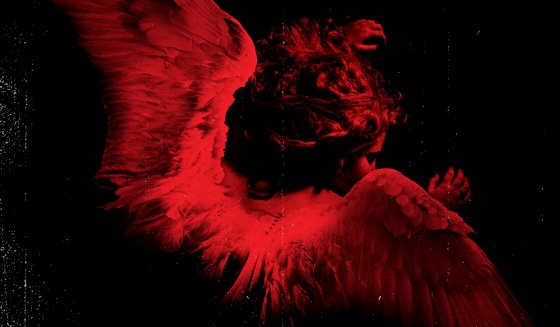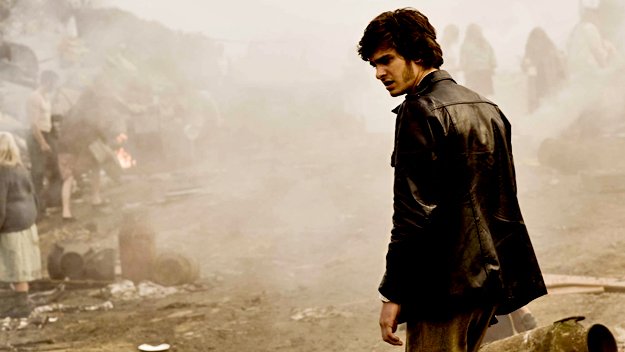
This is the North, where we do what we want.” Welllll…unless you’re Brian Clough, of course. After a rough start of Alice and Brooklyn on Friday, movies #3, #4, and #5 of last weekend righted the ship considerably. Those would be the dark and very worthwhile Red Riding trilogy, based on the four-book crime series by David Peace (also the author of The Damned United.)
Consisting of Julian Jarrold’s Red Riding 1974, James Marsh’s Red Riding 1980, and Anand Tucker’s Red Riding 1983, these, unlike the various threads of Brooklyn’s Finest, are three interlocking crime stories than actually enhance and deepen one another, all the while telling one story. And, like The Wire and unlike Brooklyn again, nothing is spelled out for the audience, and all the pieces matter. Over six hours, it all adds up to a grim, complicated, and often harrowing portrait of the Evil that Men do in deepest, darkest Yorkshire.
In the first and arguably best installment, it is the Year of our Lord 1974, and a young girl has gone missing. On the case right away is Eddie Dunford, an enterprising journalist just back from a long stint in London (Andrew Garfield, late of Gilliam’s Imaginarium), who very quickly — too quickly, for the cops on the case — ties the disappearance to two earlier murders. But when the child’s body is found, with swan wings stitched into her back, no less, the case officially passes into the hands of Jack Whitehead (Eddie Marsan, late of Sherlock Holmes), the paper’s lead reporter and something of a worthless drunk.
Regardless, Eddie’s interest is piqued, and he continues to follow the leads where they take him — from the arms of a beautiful-but-sad Girl of the North Country (Rebecca Hall) to the clutches of the local developing magnate (Sean Bean), who holds grand ambitions and no small amount of pull in the community. And, while Eddie first thought his drinking buddy Barry (Anthony Flanagan) was a wee bit paranoid for ranting on about disappearances and death squads in li’l old Yorkshire, he starts to wonder about it some when Barry becomes the victim of a horrible sheet glass accident. Was Barry in fact murdered? And if so, how deep does this rabbit hole go?
Deep enough that Detective Peter Hunter (Paddy Considine) is still trying to sort things out six years later, in the Year of our Lord 1980. A Manchester cop reassigned to this beat to help catch the Yorkshire Ripper, or at least to figure out why he hasn’t been caught after thirteen victims, Hunter and his team (Tony Pitts, Maxine Peake) uncover some…discrepancies in the case files of one of the victims. Either the police work is exceedingly shoddy, or the Yorkshire Ripper now has a copycat — or maybe it’s just convenient for some murders to look like Ripper victims.
This all brings to mind the last time Detective Hunter found himself in this godforsaken corner of the North. That would be six years earlier, when he was assigned to look into a bloody crime scene that left a few extra bullets and lots of unanswered questions. The problem is, some folks in town don’t seem to want either of these mysteries looked into anymore, and Hunter has left himself dangerously exposed by recently engaging in an illicit office romance. Something’s gotta give, and it doesn’t look like it’s going to be the wall of silence that surrounds so many of the sinister goings-on in this riding…
Cut to the Year of our Lord 1983, when, just as the Ripper’s bloody swath through this area is at last fading into grim memory, another local girl goes missing. This conjures dismal memories of the case nine years earlier for Detective Superintendent Maurice Jobson (David Morrissey, a.k.a. “The Next Doctor“), one of the higher-ups on the Yorkshire police force, who we’ve seen engaged in some dodgy behavior in the first two installments. (He’s known as the Owl, not to be confused with the Wolf, the Swan, or the Badger.)
Meanwhile, on a visit to his late mother’s home, a local solicitor (Mark Addy, soon of Robin Hood) is guilt-tripped by his old neighbors into revisiting the case of the developmentally disabled man (Daniel Mays) convicted of the 1974 child murders. Suffice to say, there are some troubling holes in the prosecution’s story, and they seem to point right back at “enhanced interrogation” practices in the Yorkshire PD. And when another local man (Gerard Kearns) is taken into custody for this new child disappearance, well, it starts to seem like this has all happened before — and the good lawyer’s father might have been deeply involved.
In all honesty, the story skips off the rails a bit in 1983 — A medium becomes involved in the previously played-straight story, and the original village conspiracies get to be a bit too baroque for plausibility. (Even notwithstanding the huge body count at this late date, there would now seem to be [spoilers-highlight to read]two different and almost-completely unrelated shady operations at work by now.) And, in any event, the overarching three-film plot becomes so byzantine at times that it does get quite hard to maintain the thread. (I’m still unclear as to why [same]the cops shot up the Kirachi Club after Eddie left in 1974. What were their intentions anyway?)
But taken as a whole, this glum trilogy has an admirably dark mojo to it. I mentioned The Wire early on, but perhaps the best analogue for these films is to think of them as sort of an extended British version of Zodiac. If you can handle the violence, the accents, and the unrelenting Yorkshire gloom, the Red Riding trilogy is worth the trip…just be careful who you talk to while you’re there.

